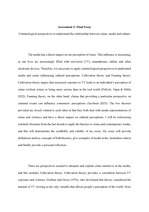

목차
없음
본문내용
The media has a direct impact on our perception of crime. This influence is increasing, as our lives are increasingly filled with television (TV), smartphones, tablets and other electronic devices. Therefore, it is necessary to apply criminological perspectives to understand media and crime influencing cultural perceptions: Cultivation theory and Framing theory. Cultivation theory argues that increased exposure to TV leads to an individual’s perception of crime (violent crime) as being more serious than in the real world (Pollock, Tapia & Sibila 2022). Framing theory, on the other hand, claims that providing a particular perspective on criminal events can influence consumers’ perceptions (Jacobsen 2023). The two theories provided are closely related to each other in that they both deal with media representations of crime and violence and have a direct impact on cultural perceptions. I will be referencing scholarly literature from the last decade to apply the theories to crime and contemporary media, and this will demonstrate the credibility and validity of my essay. My essay will provide definitions and key concepts of both theories, give examples of media in the Australian context and finally provide a personal reflection.
There are perspectives needed to interpret and explain crime narratives in the media, and this includes Cultivation theory. Cultivation theory provides a correlation between TV exposure and violence. Gerbner and Gross (1976), who developed this theory, considered the amount of TV viewing as the only variable that affects people’s perception of the world. More specifically, this theory argues that TV’s storytelling function is very powerful in shaping people’s perceptions.
출처 : 해피캠퍼스
답글 남기기